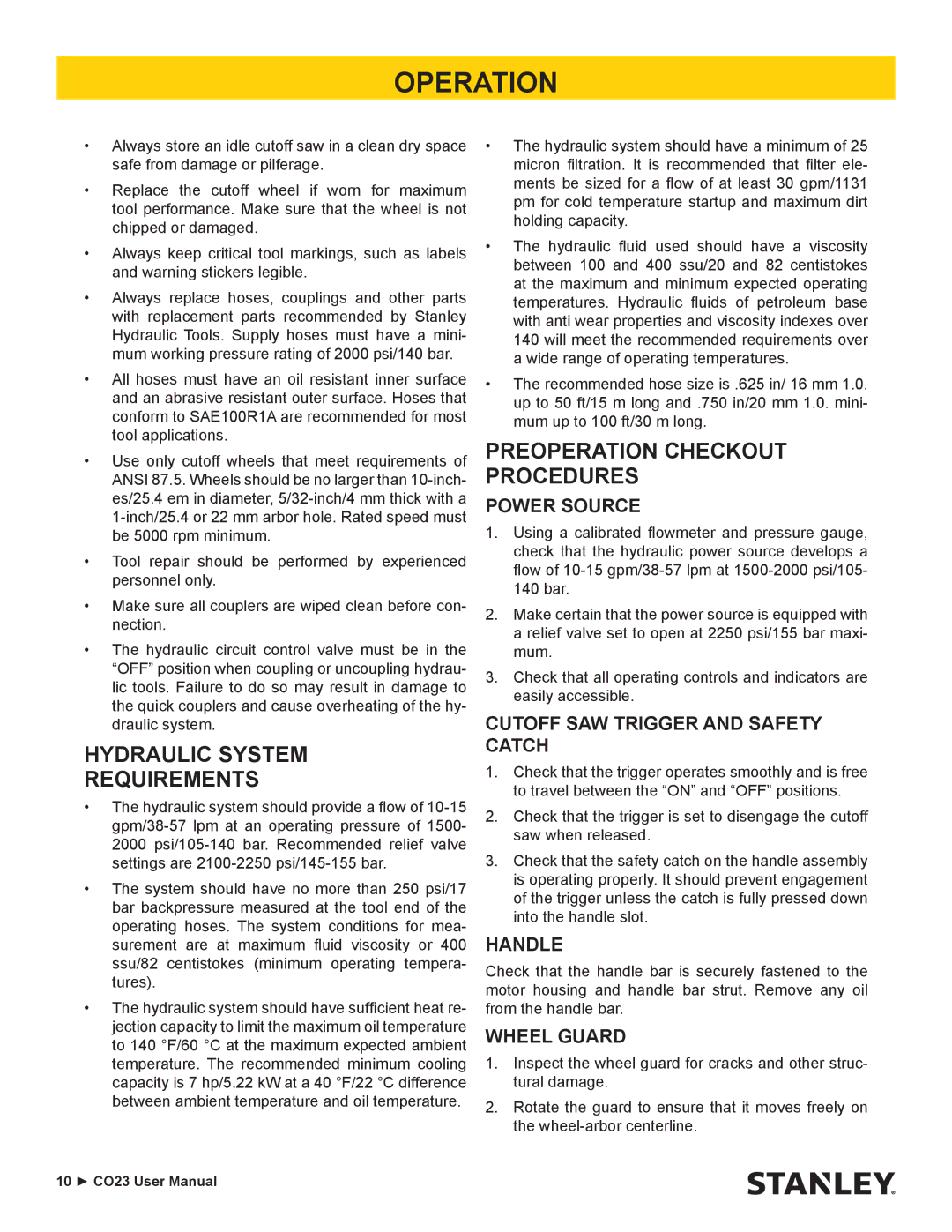
OPERATION
•Always store an idle cutoff saw in a clean dry space safe from damage or pilferage.
•Replace the cutoff wheel if worn for maximum tool performance. Make sure that the wheel is not chipped or damaged.
•Always keep critical tool markings, such as labels and warning stickers legible.
•Always replace hoses, couplings and other parts with replacement parts recommended by Stanley Hydraulic Tools. Supply hoses must have a mini- mum working pressure rating of 2000 psi/140 bar.
•All hoses must have an oil resistant inner surface and an abrasive resistant outer surface. Hoses that conform to SAE100R1A are recommended for most tool applications.
•Use only cutoff wheels that meet requirements of ANSI 87.5. Wheels should be no larger than
•Tool repair should be performed by experienced personnel only.
•Make sure all couplers are wiped clean before con- nection.
•The hydraulic circuit control valve must be in the “OFF” position when coupling or uncoupling hydrau- lic tools. Failure to do so may result in damage to the quick couplers and cause overheating of the hy- draulic system.
HYDRAULIC SYSTEM
REQUIREMENTS
•The hydraulic system should provide a flow of
•The system should have no more than 250 psi/17 bar backpressure measured at the tool end of the operating hoses. The system conditions for mea- surement are at maximum fluid viscosity or 400 ssu/82 centistokes (minimum operating tempera- tures).
•The hydraulic system should have sufficient heat re- jection capacity to limit the maximum oil temperature to 140 °F/60 °C at the maximum expected ambient temperature. The recommended minimum cooling capacity is 7 hp/5.22 kW at a 40 °F/22 °C difference between ambient temperature and oil temperature.
•The hydraulic system should have a minimum of 25 micron filtration. It is recommended that filter ele- ments be sized for a flow of at least 30 gpm/1131 pm for cold temperature startup and maximum dirt holding capacity.
•The hydraulic fluid used should have a viscosity between 100 and 400 ssu/20 and 82 centistokes at the maximum and minimum expected operating temperatures. Hydraulic fluids of petroleum base with anti wear properties and viscosity indexes over 140 will meet the recommended requirements over a wide range of operating temperatures.
•The recommended hose size is .625 in/ 16 mm 1.0. up to 50 ft/15 m long and .750 in/20 mm 1.0. mini- mum up to 100 ft/30 m long.
PREOPERATION CHECKOUT PROCEDURES
POWER SOURCE
1.Using a calibrated flowmeter and pressure gauge, check that the hydraulic power source develops a flow of
140 bar.
2.Make certain that the power source is equipped with a relief valve set to open at 2250 psi/155 bar maxi- mum.
3.Check that all operating controls and indicators are easily accessible.
CUTOFF SAW TRIGGER AND SAFETY CATCH
1.Check that the trigger operates smoothly and is free to travel between the “ON” and “OFF” positions.
2.Check that the trigger is set to disengage the cutoff saw when released.
3.Check that the safety catch on the handle assembly is operating properly. It should prevent engagement of the trigger unless the catch is fully pressed down into the handle slot.
HANDLE
Check that the handle bar is securely fastened to the motor housing and handle bar strut. Remove any oil from the handle bar.
WHEEL GUARD
1.Inspect the wheel guard for cracks and other struc- tural damage.
2.Rotate the guard to ensure that it moves freely on the
10 ► CO23 User Manual
